Erstellt am: 4. 4. 2011 - 11:55 Uhr
Indiana Jones and the Kingdom of Rust
I'm in Charleroi in Belgium and I'm staring at a lost world. Along the banks of a canal that crosses Belgium from east to west, there is a huge abandoned industrial complex. You'll see the rusted towers of a steel works, chimney, giant lifting hooks, the hap-hazard looking piles of buildings of an old coke works.
This was the world of soot and sweat that Emile Zola wrote about. This area of Wallonia was once the beating heart of carbon-intensive industry that that made Belgium and Europe rich. Glass then steel, then coal were produced here. But now it is empty. It's a decaying, drafty and echoing ghostscape.
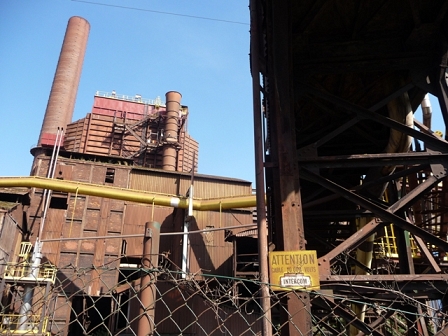
christian cummins
There's sadness here: a sense of lost pride. Wallonia, once the driving force behind Belgium has been relegated to the dependent poor southern neighbour of a resurgent Flanders, and Charleroi has an unemployment rate of over 25 percent. But although a Dutch newspaper recently voted Charleroi the "ugliest city in the world", these industrial ruins are oddly beautiful.
Click here for my rather cuffy and tentative attempts to try a video. Multimedia age - here I come
Besides, it is hard to feel too melancholy in the company of my 30 year old guide to these ruins, Nicolas Buissart. Tall, bearded, frenetic and instantly likeable, as a student of culture, he sees beauty everywhere in the ruins. "I have studied welding too, so everywhere for me here is just: wow!" For him the ugliest city in the world offers a constant source of wonder and inspiration.
He knows how to unearth surprises here too. "Feel that" he says as he drags me to up close to the fence that separates a tow-path from an abandoned steel works. A cold draft of air is cutting through the warmth of this spring lunch-time. "It's like the wind towers of ancient Persia," he tells me. The complicated system of chimneys and abandoned corridors, tunnels and factory floors have created a system of cooling air currents - a natural form of air-conditioning.
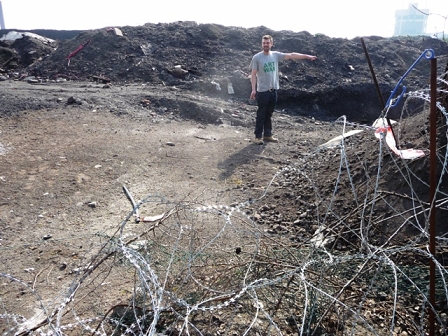
christian cummins
It's now two years since Nicolas to set up Charleroi Adventures, an alternative guided tour of the French-speaking town of 200,000 just south of Brussels. The venture has annoyed the municipal authorities, who would like to project a different image of their town, but become a surprise hit for tourists across Europe. “I think people are fed up with normal holidays” he says. “They want to do something different.”
Dieses Element ist nicht mehr verfügbar
Some come for the photos, some come for the adventure. For us, doing "something different" in Charleroi involves climbing through the window into a falling down house in one of Charleroi’s most dilapidated districts. Nicolas has never been here before and is visibly excited, scrambling in first. We creep over the assorted rubble and junk and test the creaking stairway It strains under out combined weight and looks to me to me like it is going to collapse and take to roof with it. As I think about Nicolas' insurance policy, he is peering into through the dust into a back room.
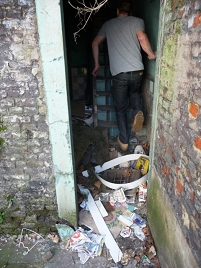
christian cummins
But isn't this voyeurism? Or worse? Nicolas charges 25 Euros for his guided tours. Is he exploiting the poverty and misery to make money. "No it is not about poverty," he says. "It is about adventure. We are adventurers in a waste land. It's like, you know, Mad Max." As he came out of the house with a grin on his face and dust in his beard, I told him he reminded me more Indiana Jones, an explorer of a more modern treasures of archaeology.
Moving on from the steel works, we hop over some razor wire to look at some green sludge by the abandoned coal works and the next stop involves a climb up what Nicolas’ calls Charleroi’s "Little Switzerland". It’s a man made mountain. A slag heap – the grassed over hillock of waste matter from coal mining: It’s the perfect place to take in the whole the view. We look down over the vast black coal fields and the towers and factories beyond. Nicholas calls it a sleeping monster, accidently or intentionally quoting Zola.
They might have reopened a coal mine in Wales recently, but the days of heavy industry in Charleroi are gone for good. So what will happen to this place? Nicolas thinks that eventually the city authorities will clean it up. “And then it will become just another boring suburb of greater Brussels where people come to sleep.” It seems so depressing, but Nicolas is still cheerful. “I am trying to build a castle on the top. It will look great. I have laid the first two bricks.” But they are no longer there, someone has rolled them down to the bottom of the hill. Even modest dreams seem to come to nothing here.
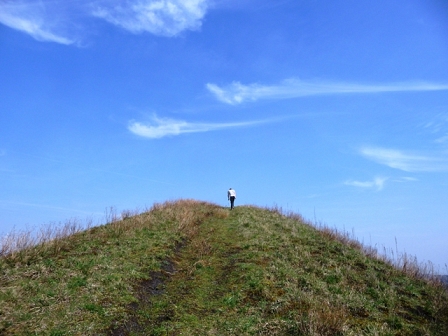
christian cummins
On the steep path down we meet two middle-aged locals who are out taking photos. I asked one, Marcel, whether he thought what he was seeing was ugly. “No,” he says ”I don’t find it ugly. I have always lived here. This place shows how life was like for a hundred years. It helped Belgium flourish. It’s part of our heritage.” Perhaps that's the real value of Nicolas' quirky tourism. The tourist board would like us to think of the medieval jewels of Ghent and Bruges when we think of Belgium, but isn't it important that we remember these places that made Europe rich and powerful before fading away and becoming an embarrassment - a dirty secret of soot and unemployment to be hidden from sight? His friend Jean-Marc agrees. “I’m taking pictures to have souvenirs because in a few years all of this won’t exist. You have to take photos now before it is lost forever.”
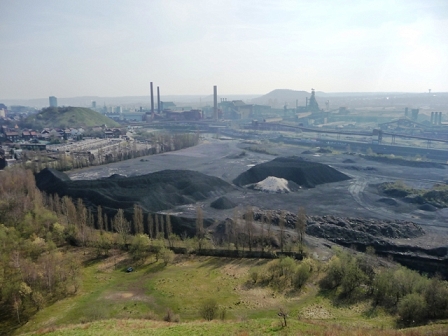
christian cummins
Nicolas is proud to be from Charleroi and, despite being an artist, proud of his working class background. On the day I arrive he is muttering about a bunch of "fine arts students from Austria" who, he says want to steal his idea because "they speak better English and can make a better website." We meet his rivals by the canal. It's a rare feat in Charleroi, but it seems he has begun a boom industry in the archeology of Europe's recent industry past.
I can't see anyone aping Nicolas's charismatically hap-hazard tours though; and who wants accent-free English? A trip on Charleroi includes a picnic that might involve swigging spirits out of a shared bottle. Tourists are driven around in Nicolas' dirty white van which doesn't have any seats. Because of this and the fact that he sometimes packs in 7 passengers, you have to duck if you see a police car, although Nicolas's thinks the cops see him benignly.
He doesn't push his luck: tours take place on Sunday when the guards have a day off so without the risk of arrest for trespassing you can look at an empty and vandalized station in Charleroi's metro system that never was. After two decades of work to 30km underground project was abandoned in the mid 1980's when the funding dried up and now remains damp and vandalized, a spectre of vain ambition and the infighting officials. As Nicolas tells me "politics got in the way". It seems a metaphor for the political decisions that are currently crippling Belgium.
There's a darkness behind the anarchic charm of Charleroi Adventures. The guided tours have gained a certain notoriety. Guests have been taken to the former home of child-killer Marc Dutroux and to the house where Maigritte's mother committed suicide. "But that is only if they insist on it" protests Nicolas.
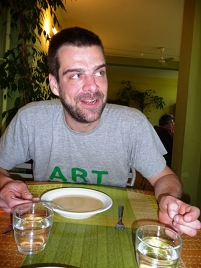
christian cummins
As there is no picnic on my one-man guided tour, Nicolas and I go to a working-man's club for lunch, where a 3 course lunch costs just 4 Euros. It's frequented by the unemployed, by minimum wages workers and by the retired. We are joined at our table by Vassilou, a vulpine faced man in his Sixties, who arrived in Charleroi from Greece as a small boy and spent his entire working life in the city. He can still remember the days when the now rusted factories were still teaming with workers and the coal seams were still being exploited. His story is a timely remind of the dangers of false nostalgia for the city's industrial past. He had just arrived when an underground accident claimed 262 lives in the mines. And his father, who is still alive, now needs a respirator to breath. He'd never smoked in his life and Vassilou attributes the illness to just 10 years of work among the toxic fumes in the coal pits.
Despite Vassilou's immigrant background, he blames Charleroi's descent from pride to poverty not on a changing world, globalization or inept politicians but on the new arrivals "from the east" who he blamed for turning the town into "a dustbin". The gypsies are the worst, he sais: "they just don't want to integrate." A waitress shushes him fondly but firmly as he raises his voice. The clientele here is an ethnic mix. Old men like Vassilou aren't really racist, says Nicolas, as we bid good-bye to the pensioner and walk out into the afternoon sunshine, "they are just living in a world that they no longer understand."
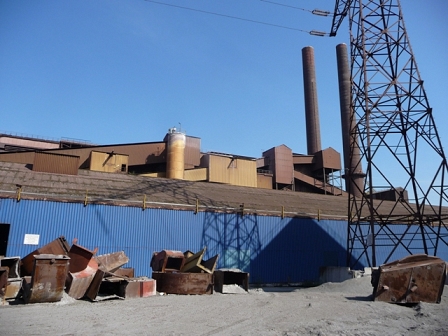
christian cummins
But what is it like for Nicolas living in the a city that has slurred as the ugliest in the world? He laughs his infectious laugh and says that the people Charleroi think it is more interesting than being somewhere in the boring middle: “Charleroi is the city of extremes. We have the worst politicians, the biggest graffiti walls and the darkest secrets. We like extremes.”


